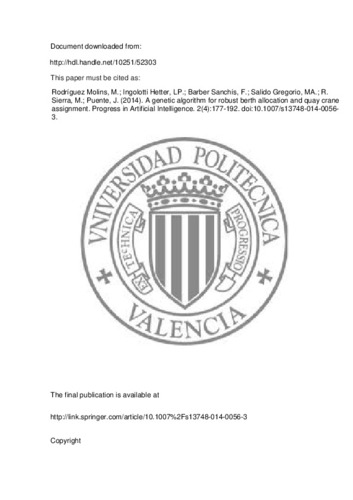A genetic algorithm for robust berth allocation and quay crane assignment
Subject:
Scheduling
Planning
Robustness
Genetic algorithms
Publication date:
Editorial:
Springer
Publisher version:
Citación:
Descripción física:
Abstract:
Scheduling problems usually obtain the optimal solutions assuming that the environment is deterministic. However, actually the environment is dynamic and uncertain. Thus, the initial data could change and the initial schedule obtained might be unfeasible. To overcome this issue, a proactive approach is presented for scheduling problems without any previous knowledge about the incidences that can occur. In this paper, we consider the berth allocation problem and the quay crane assignment problem as a representative example of scheduling problems where a typical objective is to minimize the service time. The robustness is introduced within this problem by means of buffer times that should be maximized to absorb possible incidences or breakdowns. Therefore, this problem becomes a multi-objective optimization problem with two opposite objectives: minimizing the total service time and maximizing the robustness or buffer times
Scheduling problems usually obtain the optimal solutions assuming that the environment is deterministic. However, actually the environment is dynamic and uncertain. Thus, the initial data could change and the initial schedule obtained might be unfeasible. To overcome this issue, a proactive approach is presented for scheduling problems without any previous knowledge about the incidences that can occur. In this paper, we consider the berth allocation problem and the quay crane assignment problem as a representative example of scheduling problems where a typical objective is to minimize the service time. The robustness is introduced within this problem by means of buffer times that should be maximized to absorb possible incidences or breakdowns. Therefore, this problem becomes a multi-objective optimization problem with two opposite objectives: minimizing the total service time and maximizing the robustness or buffer times
Patrocinado por:
This research was supported by the Spanish Government under research projects TIN2010-20976-C02-01 and TIN2010-20976-C02-02 (Min. de Ciencia e Innovación, Spain), the project PIRSES-GA-2011-294931 (FP7-PEOPLE-2011-IRSES) and the predoctoral FPU fellowship (AP2010-4405)
Collections
- Artículos [37321]
- Informática [869]
- Investigaciones y Documentos OpenAIRE [8276]
Files in this item





